This post may contain affiliate links to products or services. I may receive a commission for purchases made through these links with no cost on you. Please read my disclosure for more information.
Whether you want to learn a new skill or upgrade your current skills, you can find several online learning platforms that can help you stay competitive in your area of expertise.
Education doesn’t end after we graduate from school, but it is just the start of continuously learning and developing ourselves so we can keep up with today’s fast-paced world.
Acquiring new knowledge and enhancing your expertise has never been more accessible than ever before. Thanks to various online resources and online education platforms available at the tip of your fingers.
Today, let’s look at the world of online education. Let’s explore the platforms available, their advantages and disadvantages, and how you can leverage them in achieving your highest potential.
WHAT IS AN ONLINE LEARNING PLATFORM?
An online learning platform is a virtual environment that provides students with online access to courses, educational materials, and resources.
These platforms frequently include a broad range of subjects and topics to suit different interests and skill levels.
The platform allows users to watch video lectures, participate in conversations, complete assignments, take quizzes, and occasionally get certificates or qualifications upon completion of courses.
Typically, users connect with the platform using a web browser or specialized mobile application.
PROS OF ONLINE LEARNING PLATFORMS
Online education platforms offer several advantages, and these are:
- Flexibility: You can learn whenever and wherever you choose with online courses. It gives you the freedom to balance your personal and professional obligations while pursuing your academic objectives.
- Cost-Effective: Since online courses don’t need travel or lodging costs, they are frequently less expensive than traditional classroom-based instruction.
- Diverse Learning Resources: Online learning environments offer an abundance of multimedia content, such as interactive tests, video lectures, and supplementary readings, which enhance the educational process and accommodate various learning preferences.
- Learn at Your Own Pace: Self-paced courses allow you to study at your own pace, reviewing difficult material or speeding through well-known subjects as necessary to create a customized learning experience.
- Accessible Globally: You can interact and connect with a community of learners and educators all over the world and receive top-notch educational resources, thanks to online education, which cuts over regional barriers.
CONS OF ONLINE LEARNING PLATFORMS
Although there are advantages to learning online, however, they also have downsides:
- Limited Interaction: Although online courses aim to include interactive components, they might not have the same level of engagement and real-time contact as traditional classroom environments, which could hinder peer-to-peer networking and collaborative learning.
- Required Self-Discipline: Those who are easily distracted or prone to procrastination may find it difficult to keep motivated and on track with courses and assignments when learning online.
- Dependence on Technology: Using technology to support online learning means there’s a chance of technical difficulties, connectivity problems, or platform malfunctions, which could interfere with the learning process and frustrate students.
- Gaps in Quality: Before enrolling in a course, carefully consider your options and do your homework. Course providers, instructors’ backgrounds, and instructional design can have an impact on how good a course is.
- Feeling of Isolation: Because online learning lacks the social interaction and camaraderie that traditional classroom environments foster, it can be isolating and cause learners to feel disconnected or lonely.
HOW TO CHOOSE THE BEST ONLINE LEARNING PLATFORM
Choosing the best online learning platform involves considering various factors to ensure it aligns with your learning goals, preferences, and needs. Here are some key factors to consider:
- Course Catalog: A good platform should cover a wide array of subjects and skill levels to accommodate different interests and learning objectives.
- Quality of Content: Look for platforms with well-structured, up-to-date content created by knowledgeable instructors or subject matter experts.
- Instructor Expertise: Consider the credentials, experience, and reputation of the instructors who teach the courses.
- Learning Format: Choose a platform that offers content in formats that suit your learning style and preferences.
- Interactivity and Engagement: Look for features such as discussion forums, peer collaboration, live Q&A sessions, and interactive assignments that enhance your learning experience.
- Student Support and Feedback: Look for platforms that offer responsive customer support and opportunities for constructive feedback.
- Accreditation and Certification: If you’re seeking certifications or accreditation for your courses, check if the platform is affiliated with reputable educational institutions or industry organizations.
- Cost and Value: Compare subscription fees, course prices, and any additional charges for certifications or premium features. Look for platforms that offer a good balance of affordability and quality.
- Community and Networking: Look for platforms that foster a sense of community and provide opportunities for networking and collaboration with fellow learners.
LIST OF ONLINE LEARNING PLATFORMS
1. Khan Academy
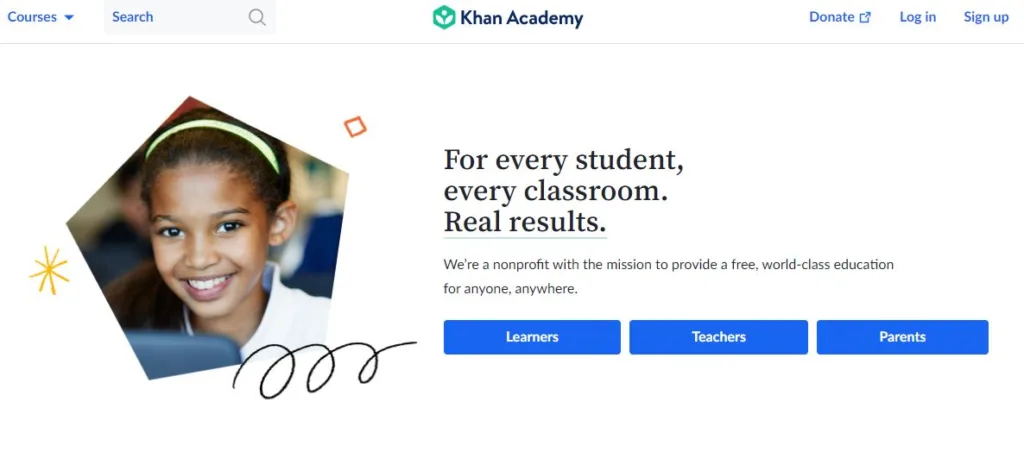
Khan Academy’s mission is to provide a free, world-class education to anyone, anywhere.
Founded by Sal Khan to assist his relatives in their math studies, Khan Academy now offers more than 10,000 video courses covering a wide range of subjects.
It offers an extensive library of educational resources to learners worldwide at no cost, subscription fees, or hidden charges, making it a valuable resource for individuals seeking accessible and comprehensive education in personal finance and other subjects.
Content is presented in a clear and accessible manner, making complex concepts easy to understand.
Pricing: Free
Key Features:
- offers interactive exercises and quizzes to reinforce learning and assess understanding of key concepts.
- Integrated streaks and other gamification components to motivate students.
2. International Open Academy
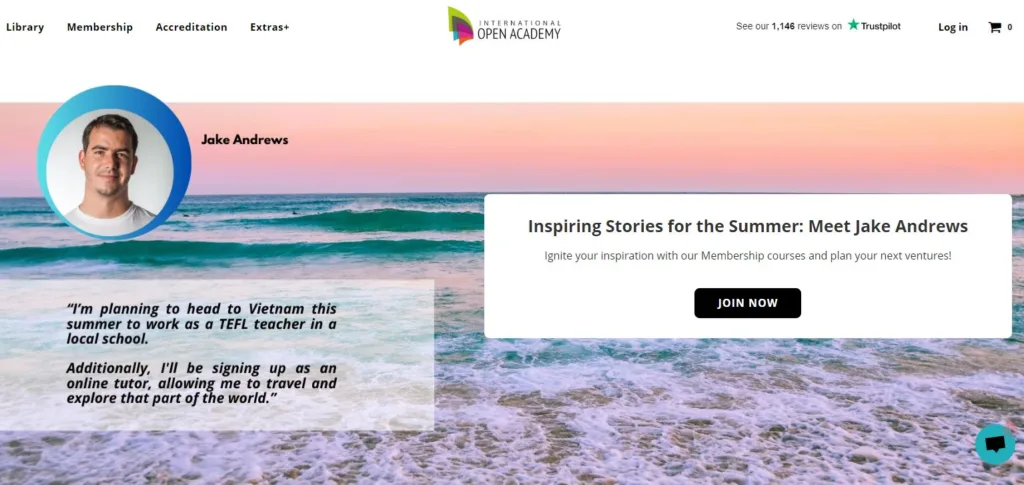
The International Open Academy, or IOA, is a membership-based educational platform for those seeking to advance their personal and professional development or begin a new freelance career with credentials that are in demand.
With more than 200 online courses accessible at present, it provides 1.5 million users with reasonably priced access to an ever-expanding library of quality content.
Driven by the enthusiasm of imaginative individuals united by a common goal, IOA endeavors to keep its content interesting and engaging by collaborating with dynamic instructors and well-known YouTube, Instagram, and TikTok makers to impart knowledge in a nurturing setting.
Pricing:
Available membership plans:
- Monthly – €11.99
- Annual – €119.00
- Lifetime – €299.00
Single course: starts from €109.00
Key Features:
- offers courses with a global perspective, addressing topics relevant to learners worldwide.
- International accredited courses by CPD, ICOES, and IAPCC.
- Enjoy exclusive member discounts.
- New courses every month.
- Affordable education with unbeatable Yearly and Lifetime Plans.
3. Coursera
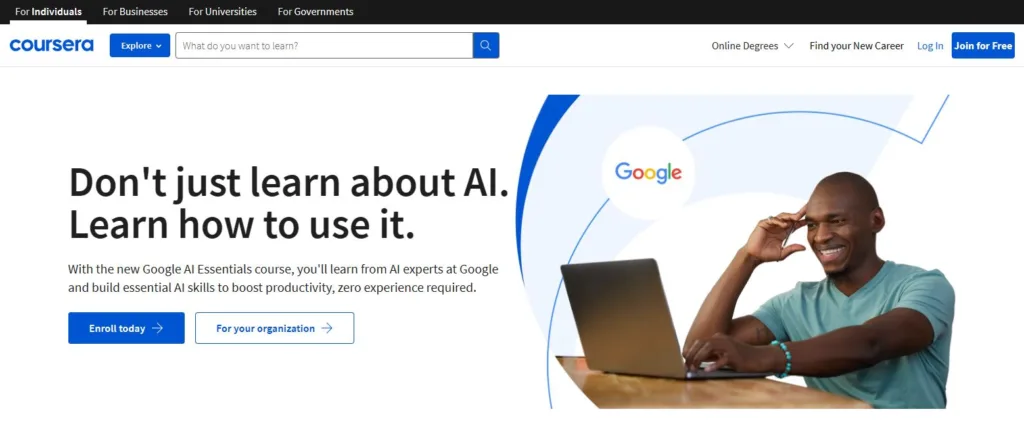
Coursera is an online learning platform that provides top-notch online training courses to people all over the world.
By collaborating with leading universities and industry experts, Coursera provides students who enroll in its paid courses with the chance to earn credentials from esteemed organizations.
With peer-reviewed assignments, homework activities, and community discussion forums, Coursera provides individual courses, specializations, certifications, and degree programs (for bachelor’s and master’s degrees) that are supported by on-demand video lectures.
Just want to share that our company subscribed to Coursera in 2022 and we benefited from their courses.
Pricing:
Coursera operates on a freemium model, offering both free and paid courses.
- Free courses (without certificates of completion)
- Paid courses: Coursera Plus, $59/month & $399/year
You can get access to videos in over 90% of courses, Specializations, and Professional Certificates taught by top instructors from leading universities and companies.
Key Features:
- Provide verified certificates to learners upon completion of paid courses.
- Offers specialized programs and degrees.
- Platform is designed for flexible learning, where learners study at their own pace and schedule.
4. Udemy
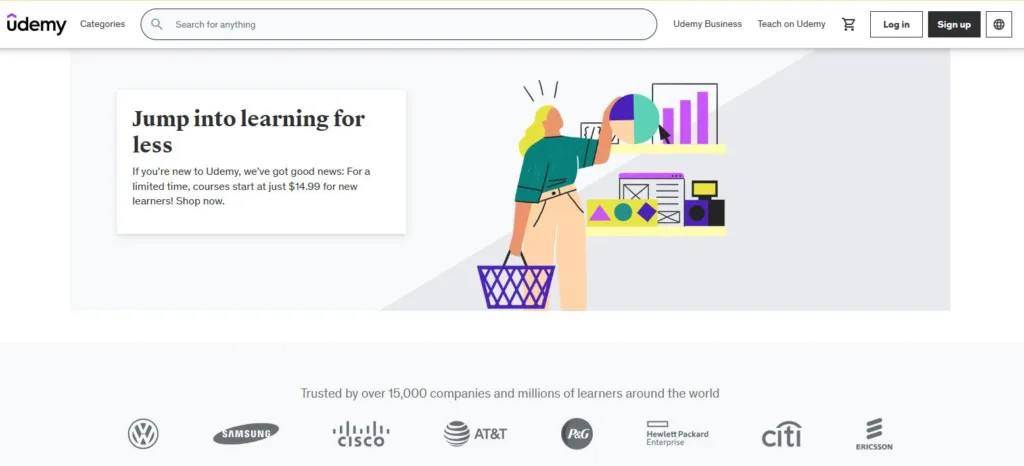
Udemy is one of the most well-known online course marketplaces, with over 210,000 online video courses.
Whether you’re a beginner looking to grasp the fundamentals or a seasoned professional seeking advanced insights, Udemy’s diverse course offerings ensure there’s something for everyone.
Courses are created by experienced instructors from around the world, providing diverse perspectives and expertise in the field of personal finance.
Learners can choose from beginner-level courses for foundational knowledge to advanced courses for specialized topics.
Everyone has the opportunity to create courses on Udemy and learn new skills.
It provides a variety of online learning resources, such as text, video, PowerPoint, and PDF documents, among many others.
By the way, I signed up for 2 courses on Udemy in 2020 and until now, I’m receiving the updates on courses I took.
Pricing:
ranges anywhere from $14 or more, depending on factors such as course duration, complexity, and instructor reputation.
Key Features:
- lifetime access to course materials, including updates and new content added by the instructor.
- include instructor support through Q&A sessions, discussion forums, and messaging.
- catering to learners from diverse backgrounds and regions.
5. edX
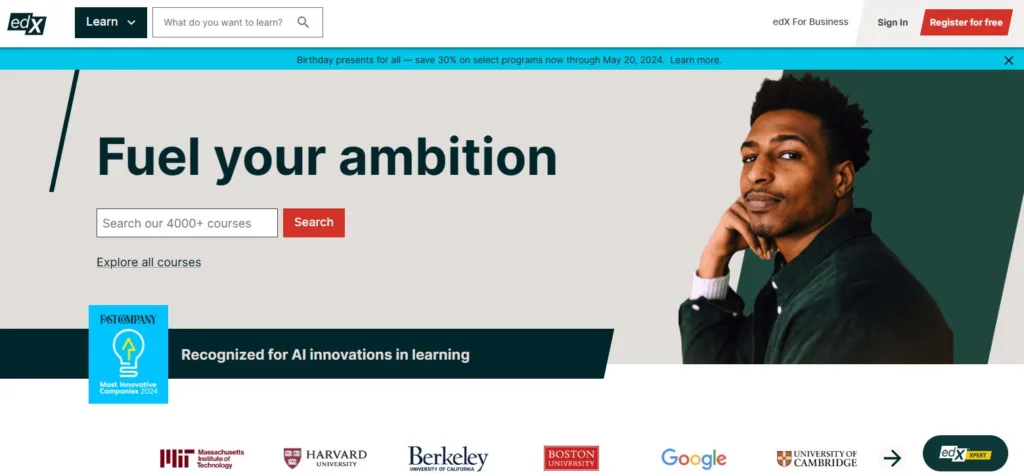
EdX is an online learning platform where students may select online courses from different universities.
Collaboratively founded by Harvard University and MIT, edX hosts high-quality courses developed by esteemed institutions worldwide.
With a focus on fostering interactive learning experiences through video lectures, quizzes, and assignments, edX empowers learners to master complex financial concepts at their own pace.
More than 4,000 online courses in a wide range of subjects are available through 250 esteemed companies and colleges through EdX.org.
The sciences—engineering, computer science, data science, math, humanities, business, and management—are their primary areas of expertise.
Pricing:
Edx, like Coursera operates on a freemium model, offering both free and paid courses.
- Free courses (without certificates of completion)
- Paid courses: ranging from $50 to $300 per course.
Key Features:
- Offers MicroMasters Programs, allowing learners to gain in-depth knowledge and professional credentials in their area of interest.
- courses are designed for professionals seeking to enhance their skills and advance their careers.
- Courses incorporate real-world case studies and practical applications to facilitate learning.
6. LinkedIn Learning
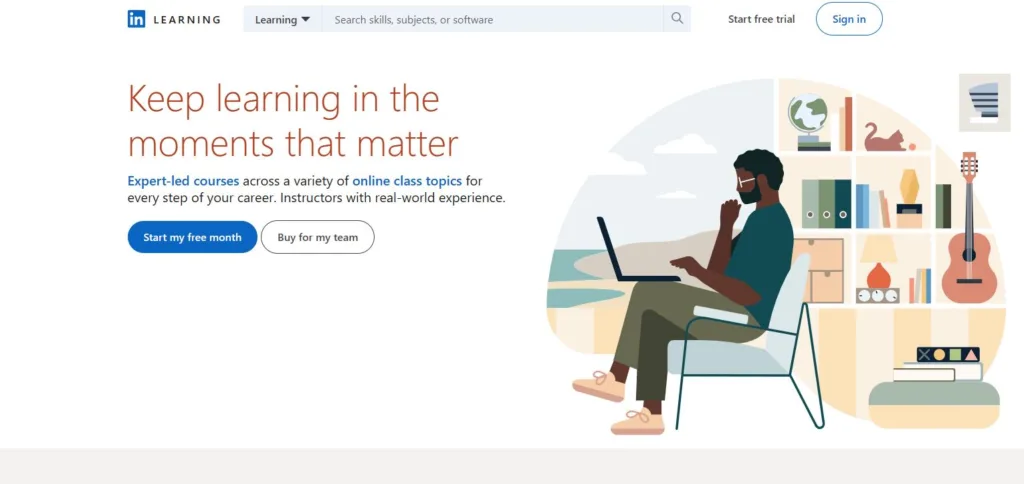
If you think that LinkedIn is only for corporate connections, well it is not only that.
LinkedIn Learning is an online learning platform that has over 22,600 courses. Integrated with LinkedIn’s professional network, this platform offers personalized recommendations tailored to your career goals and interests.
Content is curated by industry experts and thought leaders, ensuring relevance and practicality for learners.
Pricing:
- operates on a subscription basis, with fees starting at $29.99 per month for individuals.
- subscribers gain unlimited access to the platform’s entire course catalog.
- can cancel or upgrade at any time.
Key Features:
- integrated with the LinkedIn platform, allowing learners to showcase their skills and certifications directly on their LinkedIn profiles.
- provides personalized course recommendations based on learners’ professional interests, skills, and career goals.
- Dozens of courses are being added each week.
- Offers 1-month free trial.
7. Masterclass

With MasterClass, you can take advantage of unlimited access to over 200 top-notch classes, each with an average of 20 video lessons lasting at least 10 minutes.
These classes are taught by bestselling authors, professional athletes, A-list celebrities, business executives, U.S. Presidents, world-class chefs, and industry pioneers.
These courses are mostly for personal enrichment and cover topics like food, design & style, music, writing, wellness, photography, government, and sports.
Every MasterClass course includes broadcast-quality production, crisp audio and video, and incredibly captivating presentation.
Pricing:
- operates on a subscription basis, with fees starting at $15 per month.
Key Features:
- Top-notch instructors, famous from their field.
- 30-day satisfaction guarantee
CONCLUSION
In conclusion, anyone looking to advance their knowledge and abilities have a plethora of options thanks to online learning platforms available.
Through the utilization of various platforms and resources, you can initiate a transformative learning process that will enable you to make wise financial decisions and reach your long-term financial objectives.
But it’s crucial to be aware of any possible negative effects and take proactive steps to reduce them through discipline, self-control, and wise course selection.
With dedication and perseverance, online education can serve as a catalyst for personal and professional growth.
ACTION PLAN
1. Which online learning platforms do you want to try?
2. Do your assignment and ensure it aligns with your learning goals, preferences, and needs.
3. Take the course based on your research.
4. Evaluate the outcome and assess.
Happy learning!
Recommended readings:





